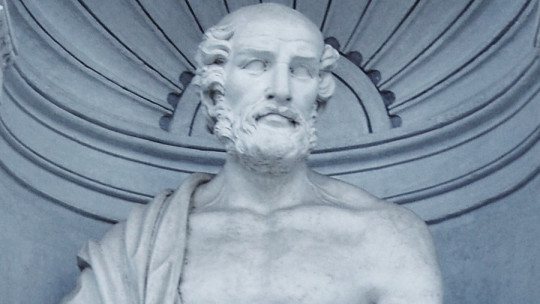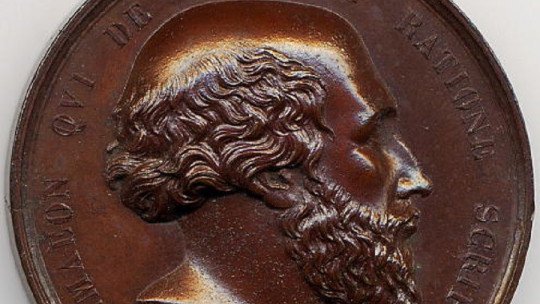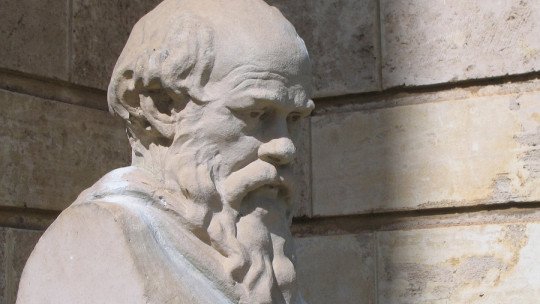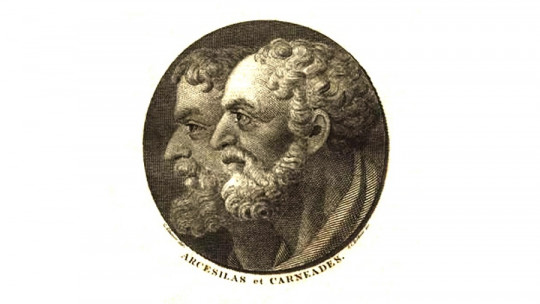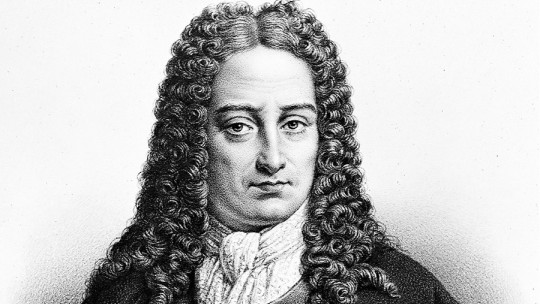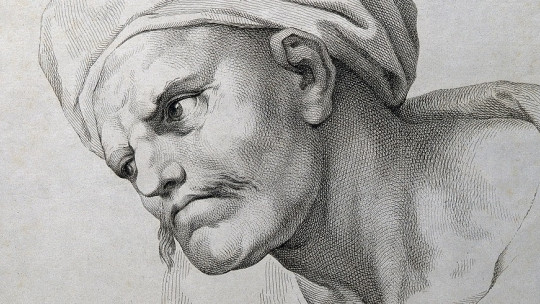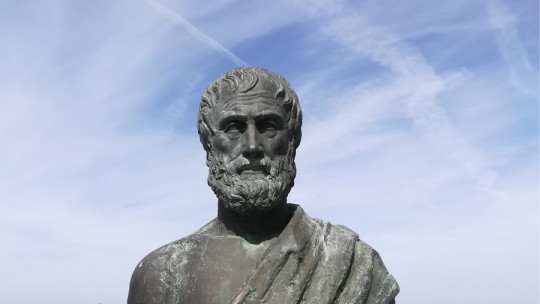
It is impossible to understand philosophy without talking about Aristotle, one of the most important and pioneering figures in this field.
The postulates of this thinker from classical Greece continue to be a fundamental pillar in current philosophical studies, even after more than two thousand years have passed since his death. With this article we will do a brief review of the life of this Greek philosopher through a biography of Aristotle in summary format.
Brief biography of Aristotle
Aristotle is and has been one of the most important philosophers and researchers in the history of humanity, at least as far as Western culture and the Islamic world are concerned. In fact, Aristotle is considered one of the main precedents of modern science, and for decades the study of nature was, in part, linked to the reading and interpretation of his written work. Here we will see a summary of his life.
Birth of Aristotle, youth and period in the Academy
In the year 384 BC, in the city of Stagira (located in the north of Ancient Greece, where Stavros is located today) Aristotle was born, a man who was destined to change, not only philosophy, but all branches of knowledge of the time. He was the son of Nicomachus, an important doctor of the time, who even treated King Amyntas III of Macedonia, which helped him establish relations with the court. As for his mother, Festis, she was also one of the Asclepiadians, the doctors of the time.
Since Aristotle’s father was the monarch’s doctor, he spent the first years of his life in the city of Pella. However, Aristotle lost his parents while he was still a child, so his guardianship passed to Proxenus of Atarneo, a city to which he moved until he was 17 years old It is at that age when they decide the next step, which would mark the rest of his life, but also that of the knowledge of the entire Western civilization that would come later: Aristotle enters the Academy of Athens.
Of course, It is at the Academy where Aristotle meets his teacher, Plato, another of the key figures of Greek philosophy. The next two decades of his life would be spent acquiring new knowledge, learning from the teachings of Plato and other teachers, or debating with other students. But, without a doubt what he liked most was reading. Not in vain, his teacher affectionately referred to him as “the Reader”, since she always found writings in his hands in an inexhaustible desire to learn more and more.
One of the teachers who initially influenced Aristotle’s thoughts was Eudoxus. However, he preferred Plato’s approaches, since he observed contradictions in Eudoxus’s. Other scholars who shared knowledge with Aristotle were Philip of Opunte or Espeusipus. Already at this time Aristotle wrote some of his important works, such as the Exhortations or Protrepticus. Unfortunately, only some parts are preserved and not the entire creation.
In the year 347 BC, Plato died. This triggers Aristotle, after 20 years of study at the Academy, to leave this place and move to Atarneo and Aso, a city governed by Hermias, with whom Aristotle shared studies years before as he was also a student at the Academy of Athens. At this time he also married Pythias of Aso whom he met because she was Hermias’s own niece, and who some time later would become the mother of his first daughter.
Subsequently, Hermias was murdered, so, once again, Aristotle set off to a new place, this time the island of Lesbos, and more specifically the city of Mytilene. It was in this place where He developed his works on zoology and also marine biology, with the collaboration of Teophrasto another philosopher and also a botanist.
Teacher of Alexander the Great
The popularity that Aristotle had already achieved at this time was such that King Philip II of Macedonia himself asked him to settle again in Pella, no less than to be the mentor of his son, Alexander the Great, who was 13 years old at the time. So during the next two years, Aristotle instilled knowledge of all branches of knowledge in the future conqueror, being key to the formation of his thinking.
Fortunately, the correspondence between Alexander the Great and Aristotle was immortalized for posterity, and it was through the work Life and Deeds of Alexander of Macedonia, written by Pseudo Callisthenes, who, although not documented, could be Callisthenes of Olynthus. , Alexander the Great’s own nephew. After two years of teaching, and the future monarch having to begin his military training, Aristotle ended the tutelage of Alexander the Great.
It should be noted that in that period Aristotle did not limit himself to sharing his knowledge with such a distinguished student, but also He was also the teacher of Cassander and Ptolemy, who would also become kings, the first of Macedonia and the second of Egypt so Aristotle was the mentor of an entire generation of young people who would end up becoming the rulers of some of the most important nations of that time.
Creation of the Lyceum in Athens
Once that stage is finished, Aristotle returns to the capital of Greece, Athens, to create the Lyceum, his own school. This name comes from the god Apollo Lycio, and the Lyceum school was built in an area that served to honor this deity. In contrast to the Academy, Aristotle decided to teach all of his teachings publicly, and without receiving financial compensation in return, and the Academy was a private center, reserved for the children of the most important families in Greece.
It is in the Lyceum where Aristotle generates the bulk of his work which, as in the other cases, has not reached our time complete, therefore preserving only some fragmented parts of various volumes, including his famous dialogues. Aristotle In the Lyceum, it brings together a huge number of volumes that would make up a majestic library with which their students would have the opportunity to obtain invaluable knowledge.
The followers of Aristotle were known by the curious name of Peripatetics, or Peripatetic school, which meant itinerant or wandering in ancient Greek, a name that came from the action of debating while strolling through the gardens of the Lyceum. Some of Aristotle’s most brilliant students would emerge from the school of the Peripatetics, such as Aristoxenus, Eudemus of Rhodes, Dicaearchus of Messina, Fanias of Eresos, or Clearchus of Solos.
Second wife and last years
During the period of Aristotle’s teachings at the Lyceum, Pythias of Aso, his wife, died. After her loss, Aristotle rebuilds his life with another woman, Herpilis of Stagira. There is some debate as to whether she really was his wife or whether she was a slave (it must be remembered that slavery was common at that time). With Herpilis he had at least one other son, named Nicomachus, to whom Aristotle would dedicate one of his best-known works: the Nicomachean Ethics either Nicomachean ethics one of the most important pieces on ethics.
In the year 323 BC, Alexander the Great died, which had other repercussions, such as citizens from Macedonia were not well regarded in Athens, and even more so someone like Aristotle, who had even been the monarch’s mentor. Therefore, he made the decision to leave the city and move to Chalcis, a city located on the island of Euboea. It would be the last place in which Aristotle would live, since he died here just one year later, when he was 61 years old.
Although the causes of death are not entirely clear, it seems that Aristotle suffered from an ailment that affected his digestive system and that could have been what caused his death. As for the location of his tomb, it is believed that it would be found in Stagira itself, the place where he was born, after studies of excavations carried out in 1996. Apparently the remains of a mausoleum and some manuscripts were found in which It would indicate that the teacher’s ashes were transferred to this place.
The influence of his intellectual legacy
Talking about Aristotle’s legacy is a practically incomprehensible task, and the fact is that most of the sciences so developed in our time would not have been able to grow to this point, or at least so quickly, if they had not been able to base themselves on the methods of data collection and systematic observation that Aristotle proposed. No doubt he supposed a huge boost for physics, biology, astronomy, but also for other disciplines, such as politics or economics
Likewise, his treatises on ethics and morals represented the bulk of one of the pillars of the thought of Western civilization. In other words, it is very likely that if Aristotle had not been born, today we would not behave or think as we currently do, nor would we have a series of values that come from Aristotelian thought. Without a doubt, a legacy on par with a genius like Aristotle.

